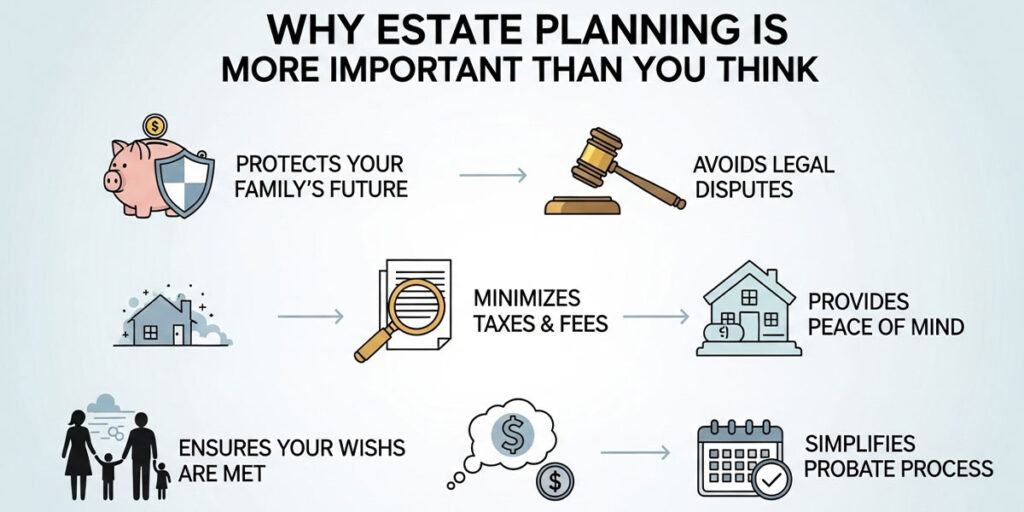Why an Estate Plan is the Most Important Gift You Can Leave Your Family
For many people, estate planning is a task that lives permanently on the “someday” list. It feels distant, slightly morbid, and something reserved for the wealthy or the elderly. It’s easy to think, “I don’t have a large estate, so it doesn’t matter,” or “I’ll get to it when I’m older.” This line of thinking is not just common; it’s one of the most financially and emotionally dangerous assumptions a person can make. The reality is that estate planning is one of the most profound acts of responsibility and love you can undertake for your family.
As a New York estate planning attorney with more than 30 years of experience, I have been a firsthand witness to the two divergent paths a family can take after a loved one’s death. One path is marked by clarity, peace, and an orderly transition, allowing the family to focus on grieving. The other path is a chaotic maze of court proceedings, family conflict, and unnecessary financial loss. The only difference between these two paths is the existence of a well-crafted estate plan. At Morgan Legal Group, we want to move this task from your “someday” list to your “today” list by illuminating why estate planning is far more important than you ever imagined.
It’s Not About How Much You Have, It’s About Who You Love
Let’s dismantle the biggest myth from the start: estate planning is not about the size of your estate. It’s about the people in your life. Whether you have $10,000 or $10 million, you have people you care about and wishes you want to be honored. An estate plan is the only way to ensure that happens. It is your instruction manual for the future, a way for you to continue protecting your loved ones even when you are no longer here.
Reason 1: It Provides for and Protects Your Minor Children
For parents of children under 18, this is the single most compelling reason to have an estate plan. There is no other priority that even comes close.
Appointing a Guardian: Your Most Critical Decision
If you and your child’s other parent were to pass away, who would raise your children? Who would make the day-to-day decisions about their health, education, and well-being? If you do not answer this question in a legally valid will, a judge in a New York guardianship court will answer it for you. A judge who does not know you, your children, or your family values will make this life-altering decision. This can lead to devastating family battles as different relatives may petition the court for custody.
A will is the *only* legal document where you can nominate a guardian. This nomination is not binding on the court, but it is given immense weight and is rarely overturned unless the chosen person is clearly unfit. This is your chance to ensure your children are raised by the person you trust most.
Managing Their Inheritance
Without a plan, any inheritance you leave to your minor children will be managed by a court-appointed property guardian and will be handed over to them in a lump sum the moment they turn 18. Very few 18-year-olds are equipped to handle a significant inheritance responsibly. Through a will or trust, you can appoint a trustee to manage the funds for your children’s benefit and dictate that the funds be distributed at more mature ages, such as 25, 30, and 35.
Reason 2: It Protects You During Your Own Incapacity
This is the aspect of estate planning that is most often overlooked, yet it is arguably the one that will have the most direct impact on your own life. Estate planning isn’t just about death; it’s about protecting your autonomy and well-being if you become unable to manage your own affairs due to an illness or injury.
The Guardianship Nightmare
If you become incapacitated without a plan, no one has the automatic legal authority to make decisions for you—not your spouse, not your parents, not your adult children. Your loved ones would have to go to court to initiate a guardianship proceeding. This process is:
- Public: Your private medical and financial details are discussed in open court.
- Expensive: It involves significant legal fees, all paid from your assets.
- Time-Consuming: It can take months to get a guardian appointed, during which time your finances may be frozen.
- Humiliating: It involves a legal declaration that you are “incapacitated” and unable to manage your own affairs.
The Solution: The Incapacity Documents
A simple set of estate planning documents can completely avoid this crisis:
- A Durable Power of Attorney appoints a trusted agent to handle your finances.
- A Health Care Proxy appoints a trusted agent to make your medical decisions.
These documents keep you in control by allowing you to choose your decision-makers in advance, keeping your private life out of the court system.
Reason 3: It Avoids the Cost, Delay, and Publicity of Probate
When a person dies with assets in their name alone, their estate must go through a court process called probate. A will does not avoid probate; in fact, a will is the central document that probate is designed to validate.
The Downsides of Probate in New York
- It is Slow: A simple probate proceeding in New York can take 6-12 months. A complex or contested one can drag on for years, during which time your heirs may not have access to their inheritance.
- It is Expensive: Probate involves court filing fees, executor commissions, and attorney’s fees, all of which are paid from your estate’s assets, reducing the amount that goes to your loved ones.
- It is Public:
A well-structured estate plan, often using a Revocable Living Trust, can allow your entire estate to bypass probate, saving your family time, money, and stress.
Reason 4: It Ensures Your Assets Go to the People You Choose
This may seem obvious, but its importance cannot be overstated. Without an estate plan, you lose your voice. You do not get to decide who inherits the assets you worked your entire life to build. Instead, your property is distributed according to New York’s rigid laws of intestacy.
The Impersonal Nature of Intestacy Law
The state’s formula for inheritance is based strictly on bloodlines. This means:
- Your unmarried partner of 30 years will receive nothing.
- Your favorite charity will receive nothing.
- A stepchild you raised as your own will receive nothing.
- A distant blood relative you’ve never met could inherit everything.
Your estate plan is your only opportunity to override these default rules and create a distribution plan that reflects your true relationships and values. This is where an expert attorney like Russel Morgan, Esq., can help you craft a plan that is a perfect reflection of your wishes.
Reason 5: It Minimizes Family Conflict
The death of a loved one is an incredibly emotional and stressful time. The last thing a grieving family needs is to be thrown into a state of confusion and conflict over your assets. An estate plan is a powerful tool for preserving family harmony.
How a Plan Prevents Disputes
When you die without a plan, you leave behind a vacuum of uncertainty.
- Who is in charge? Siblings may fight over who should be appointed to administer the estate.
- What did you want? Without written instructions, family members may have different interpretations of your wishes, leading to arguments.
- Is the division fair?
A clear, well-drafted estate plan eliminates this uncertainty. It provides a clear roadmap for your family to follow. By making the difficult decisions yourself, you spare your loved ones from having to make them—or fight over them—later. This is particularly crucial in cases involving complex family law dynamics or second marriages. If you’re ready to create this clarity, you can schedule a meeting with our team.
Reason 6: It Can Protect Your Heirs’ Inheritance
A sophisticated estate plan doesn’t just focus on *who* inherits, but also *how* they inherit. Leaving a large, outright inheritance to a beneficiary can sometimes do more harm than good.
Protecting Assets with a Trust
Instead of leaving assets directly to your heirs, you can leave them in a trust for their benefit. This can provide powerful protections.
- Protection from Creditors: Assets held in a properly structured trust can be shielded from the beneficiary’s future creditors or lawsuits.
- Protection from Divorce:
- Protection from Immaturity: For young beneficiaries, a trust ensures the funds are managed responsibly until they are old enough to handle the wealth themselves.
This level of protection is impossible without proactive planning.
Reason 7: It Can Preserve Your Wealth from Taxes and Long-Term Care Costs
For those with larger estates or those concerned about future healthcare needs, estate planning is a critical wealth preservation tool.
Minimizing Estate Taxes
New York has its own estate tax with a lower exemption than the federal tax. For residents of high-cost areas like Brooklyn, it is surprisingly easy to have an estate subject to this tax. Strategic planning using tools like irrevocable trusts can significantly reduce or even eliminate this tax liability, preserving more of your assets for your family.
Planning for Long-Term Care
The cost of nursing home care is a major threat to the financial security of many seniors. Elder law is a branch of estate planning that focuses on protecting your life savings from being depleted by these costs, often while helping you qualify for Medicaid. This planning must be done years in advance. Ignoring it can mean the difference between leaving a legacy and having your entire estate spent down on care. This is also a key tool in protecting against elder abuse by placing assets in protected structures. For more on this, authoritative sources like the National Institute on Aging provide valuable context.
The Most Important Gift You Can Give
As you can see, the importance of estate planning extends far beyond simply distributing property. It is your tool to protect your children, preserve your autonomy, avoid court, eliminate conflict, protect your heirs, and preserve your wealth. It is your final act of control and your final gift of peace and security to the people you love.
At Morgan Legal Group, we have built our practice on a deep understanding of the true importance of this work. We don’t just see ourselves as drafters of documents; we see ourselves as architects of our clients’ legacies. We take the time to understand what matters most to you and build a plan that honors it.
If you have been putting off your estate plan, we urge you to reconsider. The risks of inaction are too great. Contact Morgan Legal Group today to take the first step toward the peace of mind you and your family deserve. You can see what our many satisfied clients have to say about our work on Google.



